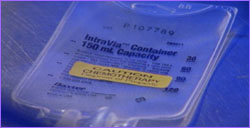
|

|
Possible Cancer Treatments
Help/Resources
| FAQs
Surgery - Surgery remains one of the most effective
weapons against multiple kinds of cancer. Many cancers,
however, are inoperable (because of location, for example),
and many operable cancers require traumatic surgery. Doctors
and scientists are devising new techniques to reduce the
trauma of surgery, such as lymphatic mapping with dyes and
radioactive tracers, which may help surgeons be more
selective and less invasive when removing cancers.
Radiation - Radiation has been used for decades as a
tool for eradicating many kinds of cancerous cells
(especially in the prostate, solid tumors in internal
organs, and lymphomas), but it is also harmful to the body's
healthy cells. Doctors and scientists are in the process of
perfecting radiation techniques that use 3-D images to home
in on individual cells, aiming precisely at the cancer and
sparing healthy tissue.
 Chemotherapy - Chemotherapy is an increasingly
important aspect of cancer treatment. Alkylating agents,
which work by impairing cell division, and antimetabolites,
which interfere with the enzymes that allow cancer cells to
thrive, are used to attack malignant cells. Chemotherapy has
serious drawbacks, however, as the drugs destroy both
healthy and cancerous cells and can result in terrible side
effects. Work is being done on tumor specific agents that
attack only cancer cells.
Chemotherapy - Chemotherapy is an increasingly
important aspect of cancer treatment. Alkylating agents,
which work by impairing cell division, and antimetabolites,
which interfere with the enzymes that allow cancer cells to
thrive, are used to attack malignant cells. Chemotherapy has
serious drawbacks, however, as the drugs destroy both
healthy and cancerous cells and can result in terrible side
effects. Work is being done on tumor specific agents that
attack only cancer cells.
Anti-angiogenic drugs - Anti-angiogenic drugs contain
organic or synthetic molecules that can block the formation
of new blood vessels in the body and destroy existing
abnormal blood vessels. Since growing tumors secrete
substances that stimulate new blood vessel growth in order
to receive the nutrients they need to live and enlarge,
anti-angiogenic drugs may help to "starve" tumors and
inhibit the progression of many kinds of cancer. At this
time, anti-angiogenic drugs are available only in clinical
trials. Their utility has not yet been clinically proven.
Anti-metastatic drugs - The most lethal aspect of any
kind of cancer is the possibility of metastatic spread from
one primary tumor to other points in the body. Scientists
now understand that cancer cells are helped along in their
journey through the body by special enzymes that allow them
to pass easily through capillary walls. Anti-metastatic
drugs, which are still being tested in clinical trials, may
be able to block these enzymes and confine cancer cells to
the primary tumor. As with anti-angiogenic drugs, the
utility of anti-metastatic treatments are as yet clinically
unproven.
Anti-oncogenic drugs - In order to grow, tumor cells
produce chemical growth factors by switching on oncogenes.
Many tumors rely on a mutation of the RAS oncogene in order
to develop. Scientists hope that new anti-oncogenic drugs
designed to inhibit the growth-inducing signals produced by
the RAS oncogene could stop cancer cells in the breast,
colon, pancreas, and lung in their tracks early on in their
development.
Chemoprevention therapies - Chemoprevention therapies
aim to prevent the recurrence of cancer in patients who are
in remission. In the case of breast cancer, for example, the
drug Tamoxifen has been shown in some women to effectively
block estrogen from feeding the growth of potential tumors
in the breast.
Dr. Folkman Speaks
|
Cancer Caught on Video
Designing Clinical Trials
|
Accidental Discoveries
| How Cancer Grows
Help/Resources
|
Transcript
|
Site Map
|
Cancer Warrior Home
Editor's Picks
|
Previous Sites
|
Join Us/E-mail
|
TV/Web Schedule
About NOVA |
Teachers |
Site Map
|
Shop |
Jobs |
Search |
To print
PBS Online |
NOVA Online |
WGBH
©
| Updated February 2001
|
|
|